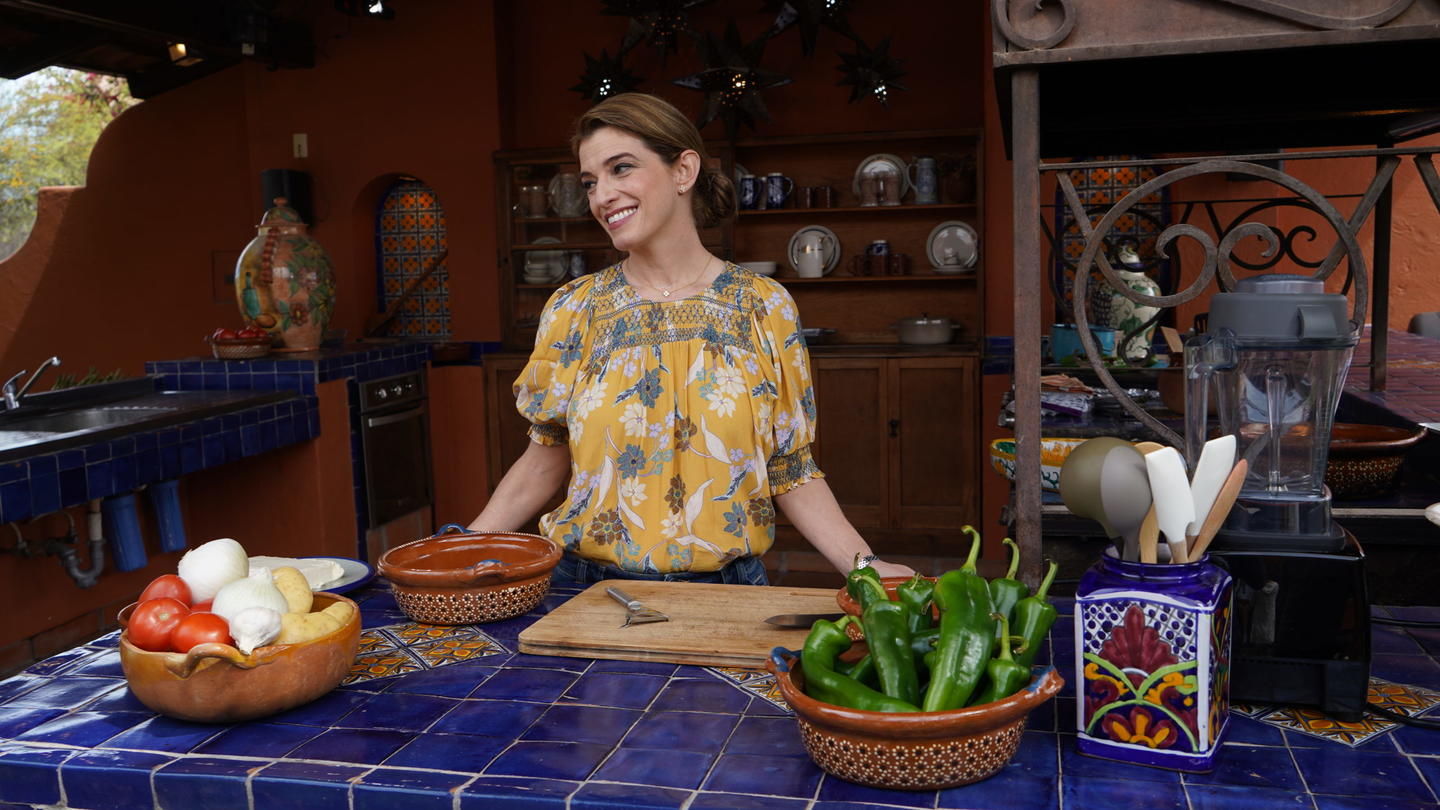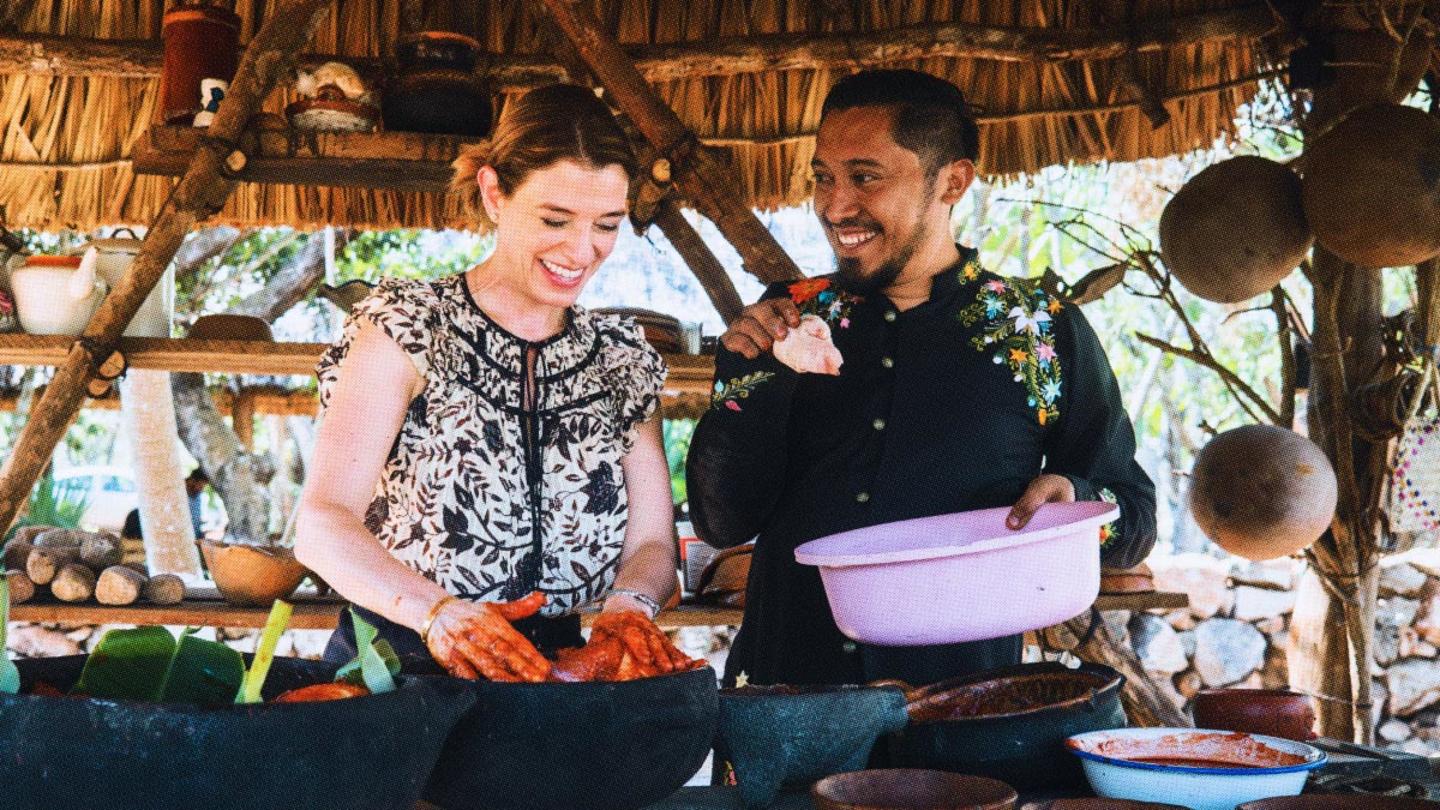Pati Jinich is a Mexican chef best known for her three-time James Beard award-winning and Emmy nominated TV series, "Pati's Mexican Table." She began her career as a policy analyst focused on Latin America. After seeing food's power to connect people across diverse backgrounds, Pati left her academic track to become a chef, cookbook author, and TV host committed to sharing the culture of her country.
In May, Pati joined Dhani Jones for an episode of Stand Together Live to discuss her unique path to the culinary world. In this Q&A, Pati dives deeper into her personal background, offers new perspectives on the role of food in cultural dialogue, and even shares one of her favorite recipes to try during Hispanic Heritage Month.
What inspired you to transition from a career in political science to one focused on food?
Originally, I wanted to be an academic in Mexico. I thought that with research, ideas, and conversation I could help, as much as I could, to strengthen Mexico's democratic institutions and civic culture. Then I moved to the U.S., and a few things coincided for me that created an early existential crisis of sorts that led me to take a leap of faith and switch careers.
After working at a policy research center in D.C. for a year and a half, I grew very frustrated — I felt like I was in a void where I wasn't helping enact change or helping people in any meaningful way. We had meetings and papers were written. Then we'd have those meetings again, and the same papers would be written again, a few people would read them, and things just stayed the same.
By then I had two young kids, and I was pregnant with my third. I really wanted to set an example for them of not only working hard but also of taking risks and fighting for what you believe in. And here I was, waking up every morning, putting them in daycare and school, working all day, coming back and feeling like I wasn't helping bring about change or contributing to the wellbeing of more people.
I was always obsessed with food — I love eating and come from a family of cooks. I realized that food was a way that I kept myself close to home. It was also a way to share who we were with the people we were connecting with here in the U.S. So I decided that if I wanted my kids to take chances, I needed to take a chance too. I resigned from my job and enrolled in culinary school at night. I wanted to demonstrate how Mexican food, culture, and cuisine could enrich any kitchen in any home. I started teaching cooking classes and writing about Mexican food and culture.
You often talk about addressing misconceptions about Mexico and Mexican food. How was that informed by your experience moving to the U.S.?
When I first moved to the U.S., I found that some people have very set ideas of who Mexicans and Latinos are. I remember people would ask me where I was from because my English wasn't that great, and I had a much heavier accent than I do today. And I would say, "Guess." They would guess Argentina or Poland, France, or Italy… but when I said I was Mexican, I saw the disappointment in their faces. They would say things like, "Wait a minute, you don't look like my Mexican gardener." My children would get invited to a playgroup, and once the parents realized we were Mexican, we weren't invited back. It was insane.
I was being hit by all these preconceptions about who Mexicans are, what we look like, what our culture is, and if we contribute to the United States or not. Something similar happens with our food. There are so many myths about Mexican food being greasy, cheesy, and unhealthy. I wanted to help shine a light on all that I knew to be true.
Your family has a rich and complex history in Mexico — you're the granddaughter of Jewish immigrants from both Poland and Austria. How does your family's story affect your understanding of heritage?
Even many Mexicans don't know how diverse our country is. We were taught in school that Mexico was a mix of native Mexicans and Spanish — the Mestizo culture. But little has been said and barely nothing taught about the 200,000 African slaves that were brought into Mexico by the Spanish, and who created the rich and diverse Afro-Mexican culture that just started to be recognized, researched, and understood in recent years. The same thing [happened] with the big waves of Philippinos that came during colonial times, the Chinese migration, the Japanese, the Lebanese, the Syrian, the Jews. It is a much richer, more complex, more fascinating mix of cultures than we often assume it to be.
With my own heritage, I walk two simultaneous lines — I try to honor everything that I've inherited from the Mexican culture and cuisine, as well as my Jewish history. I learned early on from my grandparents, and from the example of how they lived their lives, that you pay tribute to where you come from. You respect and honor it, and at the same time you are grateful, and you try to enrich the place that welcomes you. One of the most noble and delicious ways to do it is through food.
How does food address the complex issues you've shared?
One of the reasons I switched from politics to food is because politics can get so divisive. Conversations can easily get into an endless gridlock. I love food because food finds a way to connect people. It opens new doors and creates a new language that is more subtle and kind. Dishes and ingredients have traditions and stories that open your world. With each new dish, you learn about other people's stories — it's like having a magical, and edible, library in your kitchen.
When you're sitting and having a difficult conversation, you're more open to learning about the other person when you're sharing a food that they or you love. You are opening up. You are building a bridge. We all find common ground in the foods that we love, that nurtured us and that show the world who we truly are. It connects us all to our roots and the respect we all have for the essential and important things.
How do you see immigration reflected in America's food culture?
Cuisine needs fresh air to thrive. Just as we need to pass on the foods and techniques that are classics and have been passed down through generations, we also need new inspiration, new ideas, new flavors. If a cuisine doesn't get new air, it suffocate, and it withers. Mexicans in the U.S. — and immigrants overall — bring this freshness to the American table. We bring the foods we love and are excited about sharing. We have the nostalgia to preserve things. But at the same time we have a newfound freedom to play and create new things with the new ingredients we find here. So it's like two movements happening at the same time: preserving, paying tribute, passing on, and treasuring what's been given but also sharing that with others and creating new things.
I've seen firsthand how the American palate has evolved and become much more open to new flavors, ingredients, foods. When I first moved to the U.S., Mexican food was often seen as cheesy, greasy fast food. But now there's Taco Tuesday, and people make lots of versions of phenomenal healthy tacos in their own homes.
America has benefited in such delicious ways from all the cultures and cuisines of immigrants. Even when you look at beloved classics — like Cincinnati chili or Coney hotdogs in Detroit, dressed with a meat topping created by a Greek immigrant, or Detroit-style pizza, created by Italians, or the Goetta sausage in Cincinnati, by Germans — we owe those now classic American recipes to immigrants, and they've become a part of American culture.
What do you think Hispanic Heritage Month is all about?
For me, Hispanic Heritage Month is really every month and every day. I think that it is just phenomenal that it is formally celebrated not only on a single day but during an entire month. I think people are realizing that the U.S. has only just scratched the surface in terms of what they can gain from all the different cultures and cuisines of their Latin neighboring countries and the people who have come from them.
It's not only the different dishes that you can make and the different ingredients that enrich your table, but it's all of the cultural things that surround and enrich the American way of life. Hispanic Heritage Month is an opportunity for people to embrace and enrich their lives with what Latinos bring to the table, whether it's food, music, stories, or the beautiful languages.
What is one of your favorite recipes that you feel represents your own personal heritage?
Tortilla soup is a classic dish that says a lot about Mexican food and culture. It's one bowl of soup that's delicious and happy. You can customize it, and it is so accommodating and accessible — just like us Mexicans. It is also fun because it has all sorts of toppings: crunchy tortilla crisps, buttery and soft avocado, tangy queso fresco, fresh crema… and it has a comforting, nurturing soul.
A tortilla soup is deeply Mexican, but it's very easy for Americans to include in their repertoire. It's simple, humble, accessible, friendly, and accepting. It's everything that Mexicans bring to the American table.
Want to try your hand at tortilla soup? Click here to check out Pati's recipe.
Learn more about Stand Together's issue areas.




